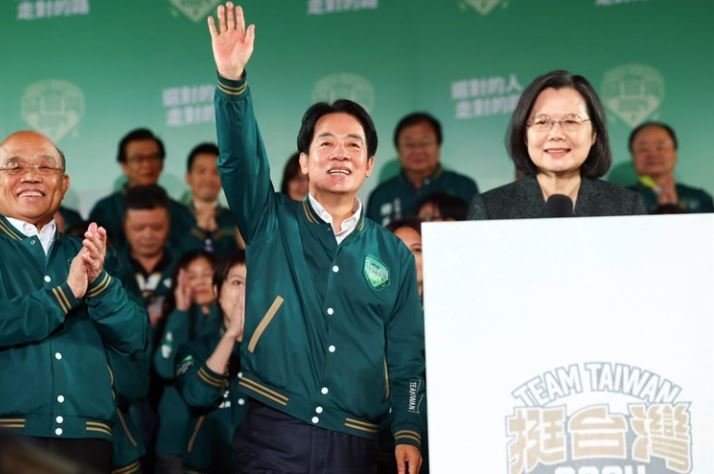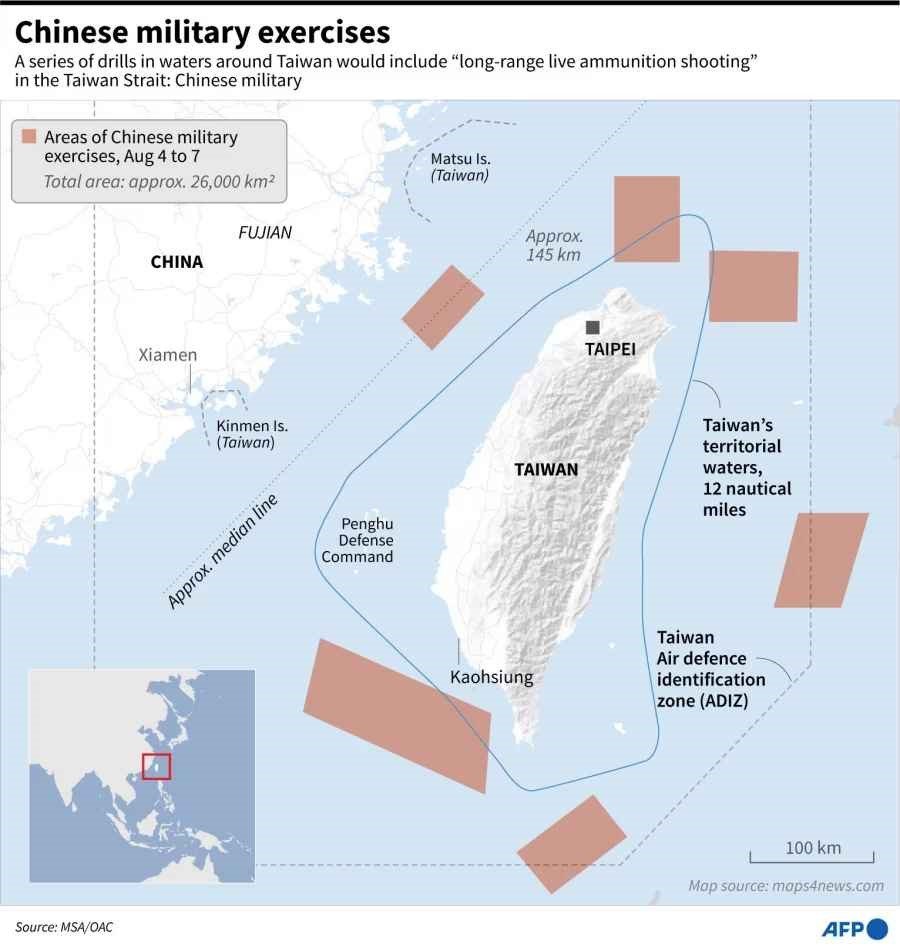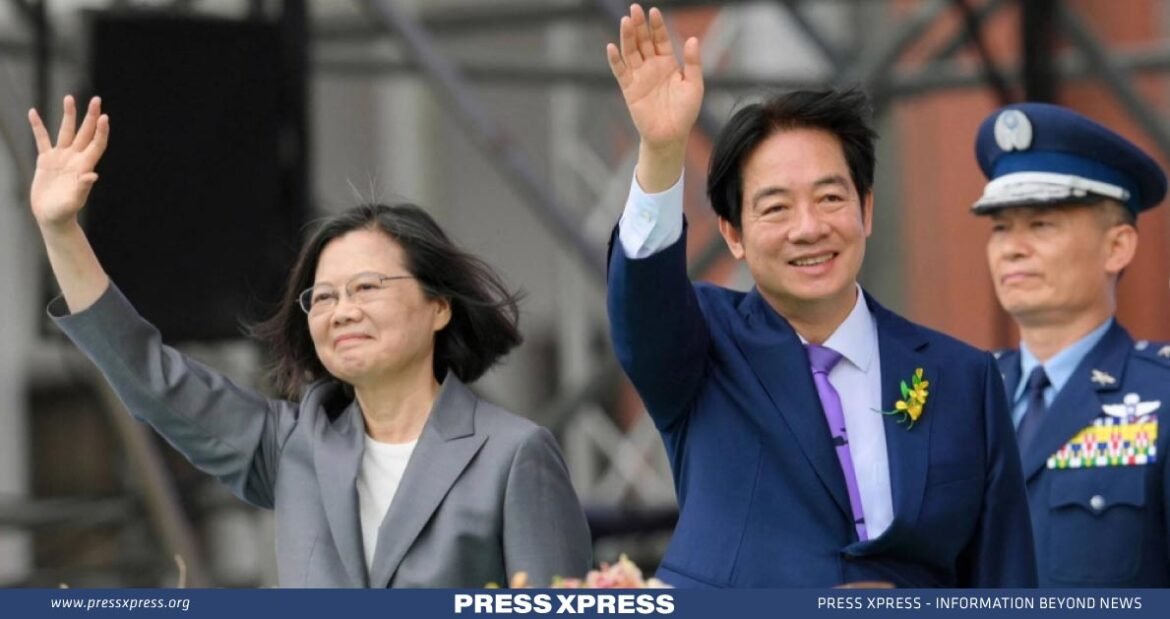The inauguration of Taiwan’s new president, Lai Ching-te, took place on May 20, 2024, amidst heightened global attention on how Beijing would respond to this development. China, which has never renounced the use of force to bring Taiwan under its control, views Lai as a “separatist.”
You Can Also Read: LAWMAKERS PUSH FOR SPACEX SERVICES TO FORTIFY U.S. DEFENSE IN TAIWAN
During his inauguration speech, Lai called for peace and urged China to cease its military maneuvering around Taiwan, which he dubbed as ‘intimidation’. The ceremony, attended by international delegates and featuring military displays, signaled Taiwan’s determination to maintain its autonomy and strengthen regional ties, despite the rising tensions with Beijing.
New President is Considered “Tough”
Taiwan’s new president, Lai Ching-te, has earned a reputation for his firm stance, and as a member of the Democratic Progressive Party (DPP), China sees him as a ‘troublemaker’.
Throughout his political career, which includes serving as vice president, Lai has consistently promoted Taiwan’s interests globally and pushed for stronger military defenses against potential Chinese aggression.
Lai’s background includes notable positions such as mayor of Tainan and premier, during which he tirelessly advocated for Taiwan’s sovereignty. Beijing has often criticized his diplomatic efforts, particularly his unwavering support for Taiwan’s self-rule and his push for international alliances, especially with the United States.

The significant public support for Lai’s strong electoral mandate, winning by over 900,000 votes, is evident. It indicates that Taiwanese people are looking for a tough, decisive leader that will likely stand up to their more powerful neighbor. His victory is a clear signal by the Taiwanese people to Beijing on what direction they expect Taiwan to take. Despite his firm stance, Lai has called for peace and dialogue with China, aiming to maintain the status quo while refusing to yield to perceived Chinese intervention.
New President, Consistent Policies
Taiwan’s new president, Lai Ching-te, plans to closely follow the policies of his predecessor, Tsai Ing-wen, aiming to maintain Taiwan’s sovereignty while avoiding direct conflict with China. Lai’s administration will focus on strengthening Taiwan’s defense capabilities by continuing arms acquisitions from the U.S. and boosting domestic defense production.
Lai has pledged to enhance Taiwan’s economic security and address domestic issues such as housing affordability and wage growth. His cabinet, filled with experienced members from Tsai’s administration, indicates a strategy of continuity, which includes keeping trusted advisors and key figures like Foreign Minister Joseph Wu to ensure a stable transition in foreign policy.
Lai’s policy approach is also expected to focus on maintaining the status quo across the Taiwan Strait. Despite Beijing’s increased military posturing, he seeks dialogue and mutual respect with China, while remaining firm on Taiwan’s democratic values and independence. This balanced stance aims to manage tensions without escalating conflicts
China’s Possible Response
Following Lai Ching-te’s inauguration, China is likely to increase pressure on Taiwan, as evidenced by the already ramped-up military activities near Taiwan, including frequent incursions by Chinese aircraft and naval vessels. These maneuvers serve the dual purpose of testing Taiwan’s response and demonstrating Beijing’s displeasure with Lai’s election.

China may also employ economic measures and influence operations to sway Taiwanese politics, such as offering economic incentives to Taiwan’s opposition parties while simultaneously imposing restrictions on Taiwanese exports. This dual approach aims to erode support for the pro-independence government.
Additionally, China is likely to persist with its “gray zone” tactics, which involve non-military measures like disinformation campaigns and diplomatic isolation. Beijing’s ultimate goal is to gradually increase its control over the Taiwan Strait without provoking a full-scale conflict.
These strategies suggest that China will maintain a hardline stance while probing for weaknesses in Taiwan’s defenses and political unity, as it seeks to assert its influence over the island nation without resorting to direct military confrontation.
Will the New President Cause Increased Tension?
The election of Lai Ching-te has already heightened tensions with China, as Beijing views him as a “dangerous separatist” and has responded by increasing military activities near Taiwan. Chinese aircraft and naval vessels have frequently crossed the median line of the Taiwan Strait, further intensifying the situation.
China’s aggressive stance suggests that more confrontations are likely to occur in the near future. Beijing has rejected Lai’s calls for dialogue and continues to claim Taiwan as its territory, signaling that tensions are likely to persist for some time.
Despite Lai’s efforts to maintain peace, his pro-independence stance, coupled with China’s strong reactions, indicates that a period of sustained tension and possible conflict across the Taiwan Strait is on the horizon, as the two sides remain at odds over Taiwan’s future and its relationship with mainland China.
Diplomatic Possibilities
The presidency of Lai Ching-te opens several diplomatic avenues for Taiwan, as he plans to continue Taiwan’s close ties with the United States, emphasizing their shared democratic values and mutual defense commitments. This approach aligns with his selection of Hsiao Bi-khim, a seasoned diplomat, as vice president.
Lai seeks to strengthen relationships with Europe, focusing on economic and political cooperation, although Europe’s cautious stance towards angering Beijing could limit these efforts. Additionally, Lai’s administration intends to foster regional partnerships, particularly with Japan and other democratic allies in the Indo-Pacific region.
While Lai has left the door open for dialogue with China, he rejects the “1992 Consensus” and maintains Taiwan’s autonomy, aiming to strike a balance between avoiding provocation of Beijing and securing international support.
The diplomatic landscape under Lai will likely be marked by efforts to sustain Taiwan’s global partnerships amidst the ongoing regional tensions and the complex relationship with mainland China.
Conclusion
The presidency of Lai Ching-te marks a new chapter for Taiwan, as his firm stance on maintaining Taiwan’s sovereignty and democratic values will shape his administration in the years to come. Lai aims to strengthen ties with the United States and other democracies, striving to balance regional stability with the cultivation of international partnerships.
Despite the possibilities of hostility from Beijing, Lai seeks dialogue without compromising Taiwan’s autonomy, and his ability to navigate these complex dynamics and maintain peace in the Taiwan Strait will be tested in the coming years.
This period will serve as a defining moment for Taiwan’s resilience and diplomatic strategies, as the nation faces ongoing regional tensions and the challenge of asserting its identity on the global stage, with Lai at the helm, guiding the country through this critical juncture in its history.


